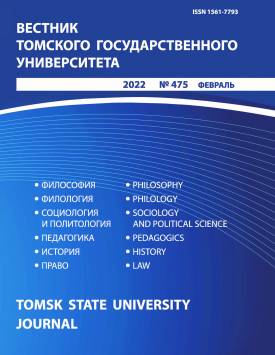The status of social actors in line with the vision of social heterology
The significance of the problems under consideration determines the aim of this study - to analyze the current trends in the description of the concept of a social subject from the standpoint of heterogeneity. The object of the research is a social subject, the focus is multiplicity (heterogeneity) as an attribute of sociality. The methodological basis of the research was the general scientific methods of induction, deduction, analogy, problematization, analysis, synthesis. The theoretical basis of the article consists of the concepts of Jacque Derrida, Gilles Deleuze and Felix Guattari, Ernesto Laclau, Philippe Lacoue-Labarthe, et al. Among Russian authors, it is necessary to emphasize the importance of the works of T.Kh. Kerimov, V.E. Kemerov, A.E. Smirnov, S.A. Azarenko, E.V. Biricheva, et al. Social reality in its dynamic aspect appears as totally pluralistic, polyphonic, variable, eventual. Plurality as an attribute of sociality gives rise to a special attitude to a social subject. The problem lies in the constant incompleteness of social cognition: it is impossible to fully cognize, understand both society as a whole and a specific other person. The main conclusions are: (1) The return of philosophy to the problem of a social subject is based on new grounds that redefine it as a changeable, dynamic, heterogeneous phenomenon. The consideration of society and an individual in this perspective sets the specifics of their post-non-classical explication. (2) The rhizome polysubject nature of society does not exclude its hierarchical structure. On the contrary, in the societal space there is a complication of the network connections of hierarchies of various types. This can be expressed by the concept of the heterarchy of social being. Social reality identifies the sphere “between” as a priority, expanding its understanding from dual to polylogical, totally pluralistic. (2) The sociematic character of cognition calls into question the cognizability of the social in general. However, the inertia and cumulative nature of social dynamics makes local cognition possible. The process of cognizing reality can be defined through the metaphor of surfing across the “folds” of being. At the same time, the constructive moment of cognition comes to the fore: cognition is the creation of reality. (4) An individual within the framework of heterology, due to the fact that it is permanently displaced relative to itself, can be understood only through fixation in its processuality (subjectivation), alterality, heterogeneity. Social cognition and interpersonal interaction are based on the presumption of identity and the presence of a relatively stable personal and cultural basis that resists significant transformations. Therefore, the sharp opposition of statics and dynamics of being/becoming seems inappropriate: it is necessary to consider their coexistence, intersection and mutual influence.
Keywords
social reality, social subject, heterology, heterarchy, society, heterogeneity, pluralityAuthors
| Name | Organization | |
| Musiets Polina V. | Military Academy of Air and Space Defence named after Marshal of the Soviet Union G. K. Zhukov | musietspv@gmail.com |
References

The status of social actors in line with the vision of social heterology | Vestnik Tomskogo gosudarstvennogo universiteta – Tomsk State University Journal. 2022. № 475. DOI: 10.17223/15617793/475/3
